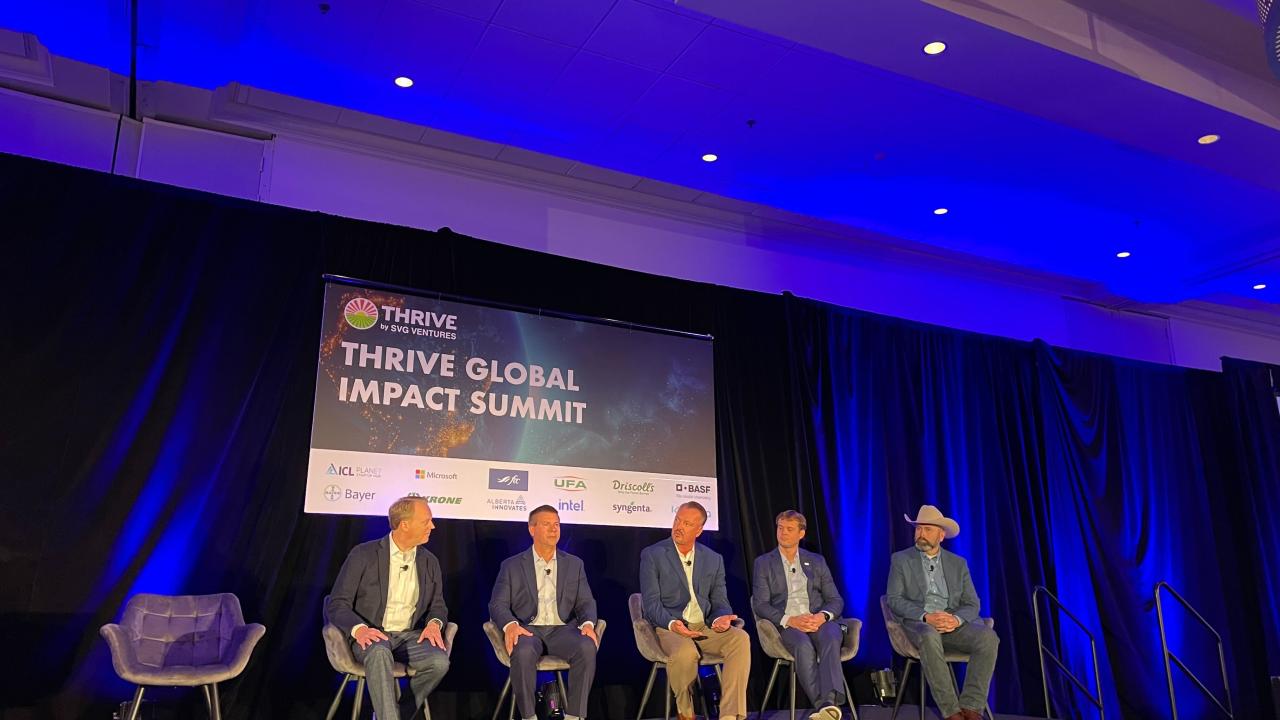
Dr. Mitloehner Discusses Reducing Methane Emissions at Silicon Valley Summit
Solving big climate challenges across the agriculture industry requires technology, innovation and discussion, all of which were part of the recent THRIVE Global Impact Summit in the Silicon Valley. The event attracted entrepreneurs, investors, and leaders from the realms of agriculture and food technology, brought together to explore topics such as regenerative agriculture, clean energy, and climate change.
While at the Summit, Director of the CLEAR Center, Dr. Frank Mitloehner participated in a panel discussion called, “Dairy’s Pivotal Role in Methane Mitigation,” in which he and others explored creative strategies for dairies to address climate issues.
Other panelists included Kyle McKinney, VP of Innovation Alltech, Matt Budine, President & CEO of Dairy Nutritionist Progressive Dairy Solutions, Matthew Cleveland, Senior Director of Global Bovine Sustainability ABS Global, Cameron Wallace, Senior Director of Strategy and Commercial Operations from Truterra LLC at Land O'Lakes. The panel was moderated by Aidan Connolly, President of AgriTech Capital.
Dr. Mitloehner started by analyzing the role agriculture, specifically livestock, can play in reducing greenhouse gases, like methane.
“Globally, livestock contribute to approximately 11% of all greenhouse gasses. In the United States, it's about 4%, so livestock’s impact on climate in the United States is about 4%,” Dr. Mitloehner said. “And the main greenhouse gas we're dealing with in the dairy industry, is methane, and methane is really different from other greenhouse gasses, because it’s short lived.”
And because methane doesn’t last as long as other greenhouse gases do in the atmosphere, Mitloehner believes this is where agriculture can make a big impact on climate change.
“What that means is that if we manage to reduce that gas, we can reduce warming,” said Dr. Mitloehner. “And if we reduce this gas, we can pull more methane from the atmosphere then is replenished. So, we do contribute to climate change. We're not the major contributor, but we are a contributor, but there are means for us to lower that and even become part of the climate solution.”
The panelists went on to address the unique role that agriculture plays in climate crisis, as the industry contributes to the problem but also offers potential solutions to the problem as well.
“And when we get this industry to be climate neutral, meaning not adding additional warming to our planet, that means reducing historical contributions that these industries have made to warming, and that is truly remarkable,” Dr. Mitloehner said. “And agriculture is one of the few industries that has the capacity to do so.”
Tools for Dairies to Reduce Methane Emissions
The talk then moved into ways in which agriculture is trying to make a positive impact on climate change and several panelists pointed out that there are actually less cows on dairy farms in the United States now, which means less methane is being produced, but more milk is being produced. The panel discussed that this is made possible through improvements in genetic technology, nutrition, and feed additives. And as Dr. Mitloehner pointed out, these are crucial resources for farmers to utilize as they try to be both profitable and sustainable.
“Well, I'm a proponent of a toolbox approach, and feed additives are one of the tools in the toolbox,” Dr. Mitloehner said. “And it's not just feeding, it's also breeding. It's manure management. And so, we have the capacity of reducing methane, let's say, from dairies, by 40 to 50 percent, or maybe more.”
From the Barn to the Big Screen
The group also discussed the upcoming documentary that Dr. Mitloehner is part of, and that Alltech helped to produce, that ponders the question, are we better off in a world without cows? The documentary, “A World Without Cows" addresses many of the topics the panel discussed in regard to how cows can actually play a positive part in helping the planet. In fact, dairies in the United States are playing a pivotal role in pioneering strategies that will be crucial for environmental sustainability moving forward and Mitloehner believes California dairies can offer a blueprint for the entire world in terms of success for methane reduction, dairy productivity and agricultural innovation.
“And I have seen some encouraging signs with respect to adoption of technologies here in California, the rule or the law is that our farms need to reduce 40% of methane, and our dairy industry has not been sitting on their hands,” Dr. Mitloehner said. “In fact, one technology, anaerobic digesters have been implemented, or have been implemented extensively, so much so that the dairy sector has already achieved 30% of its methane goal with this one technology alone.”
Incentive-Based Program Empowers Dairies to Reduce Methane
Dr. Mitloehner then expanded on the use of anaerobic digesters, emphasizing that California dairies have led the nation in their pursuit of producing less methane and are on the way to methane neutrality. This is in part due to the incentive-based approach the regularity arm of California has chosen to take with the state’s dairies.
“It is my estimate that within the next five years, half of our dairy cows will produce not just milk, but also biogas that will be made into transportation fuels. And that process must be continually motivated by the so called voluntary, incentive-based approach that has been a guiding principle,” Dr. Mitloehner said.
Then as the panel drew to a close, panelists were asked what three final words they would use to conclude the discussion. Dr. Mitloehner said simply, “carrots not cane,” in reference to the state collaborating with, rather than opposing the agricultural industry to address the climate crisis.
He then added, “Some people want to get rid of it, of that carrot, and replace it with a cane. But the news I have for those people is the cane does not work. We have seen it throughout the world. The carrot does work. Our dairy farmers in this state are very close to achieving full 40% reduction of methane, working with and not against farmers, is the way to do it.”
